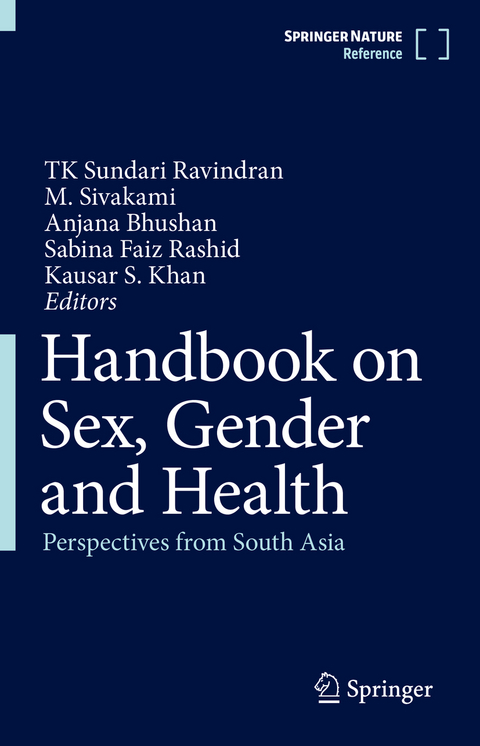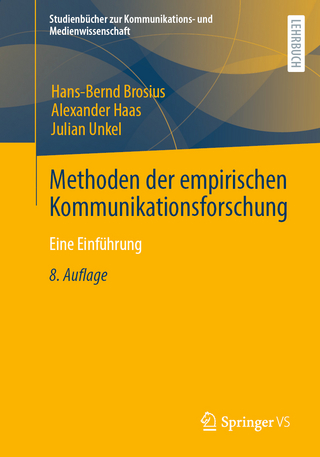
Handbook on Sex, Gender and Health
Springer Nature (Verlag)
978-981-97-2097-2 (ISBN)
- Noch nicht erschienen - erscheint am 24.01.2025
- Versandkostenfrei innerhalb Deutschlands
- Auch auf Rechnung
- Verfügbarkeit in der Filiale vor Ort prüfen
- Artikel merken
This Handbook is the first of its kind addressing gender issues in health in the South Asian Region, namely: Bangladesh, India, Nepal, Pakistan and Sri Lanka. Adopting a social determinant of health perspective and an intersectionality and diversity lens, the Handbook illustrates the multi-layered complexities of gender, health, and well-being from the diverse perspectives and lived experiences in different South Asian countries. It includes studies on under-researched and often invisible marginalized populations, such as LGBTQI populations, urban poor, persons living with disability, migrant and conflict-affected populations. It represents the voices of the elderly, adolescents, and young people. It goes beyond analyzing the problem of gender inequities in health, and present examples of gender-transformative policies, programmes and social movement action. It is an essential resource for researchers, policy-makers, students in public health and community-based organizations involvedin research, policies, or programs related to sex work, public health, social justice and gender-based violence.
TK Sundari Ravindran has more than 40 years of experience as an author and editor internationally. Sundari has more than a 100 publications to her credit, including articles in peerreviewed journals, monographs, book chapters and edited volumes. She is a lead author of several WHO publications on gender and health, with a focus on sexual and reproductive health, starting from an early publication in 1984. Sundari is also the editor of a WHO training manual on gender and rights in reproductive health. In 1992, she joined as founding co-editor of the international journal 'Reproductive Health Matters,' and continued in this position for a little over six years. Sundari is currently a senior editor of the same journal, now renamed 'Sexual and Reproductive Health Matters.' She has co-edited several books, including 'Health inequities in India: A synthesis of recent evidence' by Springer. Sundari has been a guest editor for several journal issues, and a regular reviewer formajor peer reviewed international journals including PLOS One, Global Public Health, BMJ, The Lancet, Sexual and Reproductive Health Matters, International Journal of Equity in Health, Economic and Political Weekly, and the Indian Journal of Public Health. She has also reviewed book proposals and manuscripts for Springer and Routledge publishers. As a professor at Sree Chitra Tirunal Institute for Medical Sciences and Technology, Sundari has conducted regular workshops for research scholars on scientific writing and publishing. M. Sivakami is a distinguished academic, researcher and author for over 20 years. She has published widely (90 plus articles) in peer-reviewed national and international journals such as Lancet, PLOS One, BMJ Open, Journal of Global Health, BMC-Public Health, International Journal of Health Policy Management (IJHPM), Sexual and Reproductive Health Matters (SRHM), Journal of Bio-Social Science (JBS), Asian Population Studies, Health Transition Review, Economic and Political Weekly, Indian Journal of Medical Ethics, Demography India, and Sociological Bulletin among others. She has also published chapters in books published internationally by Springer and Palgrave Macmillan. Sivakami is an Academic Editor in PLOS Global Public Health and on the editorial board of various journals. Sivakami's expertise is in the intersection of Gender, Health and Demography using mixed methodology. As a professor at TISS, Sivakami has been teaching gender and health to public health students for over a decade and believes gender is a significant lens to address health and well-being inequities in India. Anjana Bhushan retired in June 2024 from the World Health Organization, where she worked, most recently, as Technical Officer (Gender, Equity and Human Rights), in the Department of Family Health/UHC at WHO’s Regional Office for South-East Asia. In this capacity, she provided technical leadership and evidence-based advice to WHO's Member States on ways to systematically integrate gender-responsive, equity-enhancing and human rights-based approaches into health policies and programmes and to tackle gender-based violence against women and girls. From September 2018 to July 2020, as Regional Advisor, Service Delivery Systems in the Health Systems Development Department at WHO’s Regional Office for South-East Asia, she provided technical leadership and evidence-based advice to Member States on ways to strengthen the organization, management and delivery of health services that are safe and of acceptable quality. From February 2017 to September 2018, as Coordinator, Integrated Service Delivery in the Division for Health Systems at WHO’s Regional Office for the Western Pacific, Anjana was responsible for collaborating with Member States on designing and equitably delivering integrated, people-centred health services, to progress towards universal health coverage. Earlier, as Coordinator, Equity and Social Determinants in the same division, she coordinated the Regional Office’s collaboration with Member States on a range of programme areas, including: mainstreaming equity, gender and human rights into health policies and programmes; the social determinants of health; and ageing and health. Before joining WHO in 2000, Anjana worked on issues of poverty and gender in health and in development more broadly in various international agencies, including the World Bank, UNDP and ILO. She started her career as a member of the senior civil service in India, where she managed development programmes across a range of sectors for 10 years in the state government of Rajasthan. She has a Master's degree in Sociology from the Johns Hopkins University. Sabina Faiz Rashid, PhD, is a Professor and has held the Mushtaque Chowdhury Chair in Health and Poverty at the BRAC James P Grant School of Public Health, BRAC University in Dhaka, Bangladesh, since September 1, 2023. She previously served as Dean from August 2013 to 2023. With over two decades of experience as a medical anthropologist, Rashid specializes in ethnographic research on health disparities. Her work explores how structural, political, social, and economic factors, alongside gender and poverty, influence the lives, health, and well-being of women, adolescents, and marginalized communities in urban slums, refugee settings, and disadvantaged populations across Bangladesh. She has published more than 100 peer-reviewed articles, book chapters, monographs and reports (3000 + citations; h-index:30), and recently authored a book, Poverty, Gender and Health in the Slums of Bangladesh: Children of Crows (May, 2024, Routledge, UK). Rashid also serves on several national and global boards, providing thought leadership and strategic insights, contributing to research and policy development. Kausar S. Khan Educational background: MA philosophy, Karachi University; MA Philosophy, Mc Master University, Canada; Phd candidate Mc Master University, Canada. Work Experience: teaching philosophy to undergraduate students of Karachi University; teaching philosophy and religion to O and A Level students of Academy, Karachi. Started working with women in katchi abadis of Karachi (for Family Planning Association of Pakistan). Joined Aga Khan University (AKU) to be part of their endeavor for community-based teaching of undergraduate medical students. Worked in AKU till retirement (2019). Focus of work included: participatory pedagogy for community participation; participatory action research; malnutrition in children under 5, Sindh and Pakistan; women’s empowerment in Muslim contexts (5 country study). Committed to the Primary Health Care framework that includes equity and social justice, and Paolo Freire’s pedagogy of the poor. Current positions: Visiting faculty, AKU; part of IRD (interactive research and development, Karachi) initiative for mental health; advisor for community engagement, Ziaudin University's school of nursing and midwifery. Member of several boards of non-government organizations, Pakistan Key areas of expertise: participatory methodologies in teaching and practices; teaching gender, public health, social determinants of health, power, equity, research paradigms, ethics, to name some areas of work
Section 1: How Sex and Gender Differentials and Inequities Influence Health and Well-being in Specific Contexts.- Section 2: Gender issues in health systems.- Section 3: Gender and equity analysis of current policies and programmes and approaches to gender-responsive policymaking and programming.- Section 4: Advocacy, activism and social action.
| Erscheint lt. Verlag | 10.11.2026 |
|---|---|
| Mitarbeit |
Chef-Herausgeber: TK Sundari Ravindran |
| Zusatzinfo | 8 Illustrations, color; 52 Illustrations, black and white; XXXV, 1364 p. 60 illus., 8 illus. in color. In 2 volumes, not available separately. |
| Sprache | englisch |
| Maße | 155 x 235 mm |
| Themenwelt | Sozialwissenschaften ► Kommunikation / Medien ► Kommunikationswissenschaft |
| Sozialwissenschaften ► Kommunikation / Medien ► Medienwissenschaft | |
| Sozialwissenschaften ► Politik / Verwaltung | |
| Sozialwissenschaften ► Soziologie ► Gender Studies | |
| Schlagworte | communicable diseases • gender transformative • health and wellbeing. • health and wellbeing. • Health inequities • Health Policies and Programs • insectionality • LGBTQI • social determinants of health |
| ISBN-10 | 981-97-2097-4 / 9819720974 |
| ISBN-13 | 978-981-97-2097-2 / 9789819720972 |
| Zustand | Neuware |
| Informationen gemäß Produktsicherheitsverordnung (GPSR) | |
| Haben Sie eine Frage zum Produkt? |
aus dem Bereich


